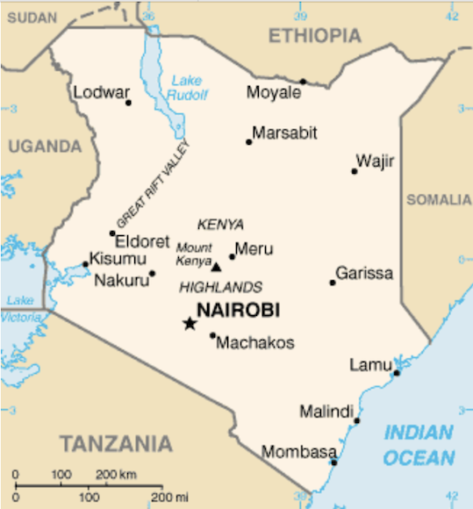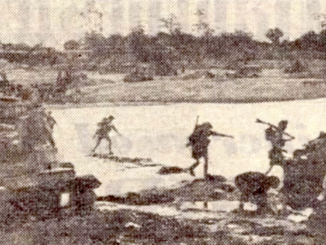In 1955, at the height of the Mau Mau Rebellion, my uncle John Alldridge produced a series of reports from Kenya for the Birmingham Mail and the Manchester Evening News – Jerry F

Kenya map from CIA World Factbook ,
CIA World Factbook – Public domain
Kamiti
I think the memory of that moment will haunt me all my life…
We were standing in the dust of the new dirt-road watching the lorry bump and bounce its way up to us. It pulled up with a jolt, and almost before the tail-board was down a horde of chubby piccanninies had scrambled over the side and were scuttering in the dust like so many playful puppies.
They were coming home from school (just as your children might be). Their mothers were waiting for them, just as you might be.
But there the likeness ends. For between the children and their mothers stood a high fence of triple-stranded barbed wire. And as each child passed in through the padlocked door in that fence a grim-faced African woman, in a cotton uniform of faded green, ran her hands expertly under the child’s clothes.
(“I know. It’s beastly. But we’ve got to do it,” said the commandant, answering my unspoken question. “You’d be amazed what those kids can smuggle in.”)
Obviously, to the “kids” — little more than babies, really — it was all part of a familiar game. They squealed with glee as they were tickled, flashing perfect white teeth: then scurried off, free to be fussed over and petted by their mothers. Take a look at that fond mother, swinging her baby up in her brawny black arms. She is a known murderess, guilty of the deaths of at least three helpless women.
Or look at that proud-faced beauty in the gay yellow dress, feeding her son from a bowl of maize porridge saved from her own ample dinner.
The yellow dress — worn in defiance of camp regulations — is the outward sign of an unrepentant, fanatical Mau Mau. The three brass bangles on her right arm tell you that she had presided as a “high court judge” over secret Mau Mau tribunals, sentencing “traitors” to the cause to their death.
These women of Kamiti — 2,800 of them, 1,600 convicts serving sentence, the remainder political detainees freed under Regulation 18B — represent the most insidious problem the Kenya Government has to face. Old and young, beautiful and downright homely, they have one thing in common. They are the hard core of Mau Mau.
None would be here unless she had committed some serious crime. For the authorities, fearing the obvious repercussions from outside, have gone to the limit of leniency with the female Mau Mau.
As it is, they are graded and carefully segregated from “black” — the incorrigibles — to lighter shades “grey,” for whom there may still be hope. They are set to work cultivating the prison’s 25 acres of vegetable gardens and puddling clay for the mud bricks of which the camp buildings are mainly built. They work well, revelling in their strength. And on a balanced diet — twice as ample as they would get in their villages — they are putting on weight.
Some have been here for a year already: some are doomed to stay here for life — unless in time a baffled Government decides (which is quite possible) to proclaim a general amnesty.
Working among them is a devoted team of British women. Rehabilitation — horrible word! — begins as soon as a prisoner shows the slightest sign of penitence: to further that end they are encouraged — the “greys” at least — to take part in classes teaching home crafts, sewing, hygiene.
It is terribly hard, uphill work. After six months, these prison-workers will tell you, there are indications that resistance is breaking down. It may be a sense of hopeless frustration or just sheer boredom: whatever the cause, the opportunity is eagerly seized upon and the reformation goes on with the inducement of little extra privileges — a visit from a travelling canteen (detainees who are prepared to work get paid a little less than sixpence a day): a game of hand-ball: permission to meet their friends within the camp.
No prisoner can become a “trusty,” or be eventually considered for release on probation, until she has publicly renounced Mau Mau and all its filthy works.
How much courage that needs is illustrated by a grim story the Commandant told me: two women who repented and took a firm stand against Mau Mau in the camp were both murdered immediately they were released. Captured “death warrants” drawn up by the underground Central Committee have already marked down for death many of those who have been brave enough to buy their freedom at the price of denouncing Mau Mau.
It is easy enough for the official handout to insist that “those in detention camps are being treated, not as prisoners being punished for their misdeeds, but as misguided members of society who are being shown the error of their ways.”
Misguided! That must have a hollow ring to the young commandant of this detention camp who has heard, over and over again, young girls boast that they have eaten human flesh or murdered their fathers because they dared resist Mau Mau. Often these women are not even convicted prisoners. They are political internees — known criminals of the worst sort upon whom judgment has been indefinitely delayed because the witnesses against them have most conveniently “disappeared.”
These are the fanatical diehards, determined that the obscene rites of the Mau Mau oath shall be practised even inside the barbed wire of a detention camp. I am, I believe, a soft-hearted sort of chap: but walking among those rows and rows of hard, brazen faces I can understand what Kipling meant when he wrote that the female of the species is far deadlier than the male…
This would be a melancholy note on which to end if, a few hours ago, I had not been shown the other side of the picture. We were standing in the courtyard of a little stone church on the Kikuyu Reserve near Fort Hall. The church had a new thatched roof: and the fresh-scrubbed walls were still smoke-stained, for just over a year ago the church was all but burned to the ground. The Mau Mau broke through the thin Home Guard defence, set fire to it and butchered the devoted African priest on his own altar.
A few weeks ago it was rededicated by the Anglican Bishop of Mombasa. “Christianity was first preached in Kenya only about 50 years ago,” the Bishop told that crowded congregation of African Christians, “yet this faith has laid such hold on the lives of your people that they have already added a Kenya chapter to the Book of Martyrs.”
It is not the white man whom the Mau Mau hate most: it is the African Christian. This has been as much a religious as a civil war. For Mau Mau, in its horrible, perverted way, is a religion — a religion that points back to barbarism and darkness.
In the African Church it has met its match. In spite of terror, in spite of persecution, in spite of the fair-weather “Christian” who fled at the first sign of danger, the African Church has stood firm: losing many of the faithful, it is true, under the pangas of the enemy, but gaining new adherents all the time.
Detention camp commandants, like the one I met here at Kamiti, are chary of the “Bible-punchers,” the glib “Christians” who flourish a Bible and swear — in Mission English — that they have never been Mau Mau. There are many experienced District Commissioners who have grown wary of well-intentioned missionaries who count their souls saved as if it were part of a sales drive. But for the staunch African Christian, whose religion is as staunch, as uncompromising as a Wee Free Kirker’s, they have nothing but respect.
These African Christians have been tried and tested in the fire. During the worst days of Mau Mau, when they faced a persecution which made Nero’s a joy-ride by comparison, their nightly prayer was: “Not that we may be kept safe, but that we may be kept faithful.”
And not for nothing, as they carried a murdered comrade to the village graveyard, would they sing: “Onward, Christian Soldiers”…
Reproduced with permission
© 2024 Newspapers.com
Jerry F 2024



